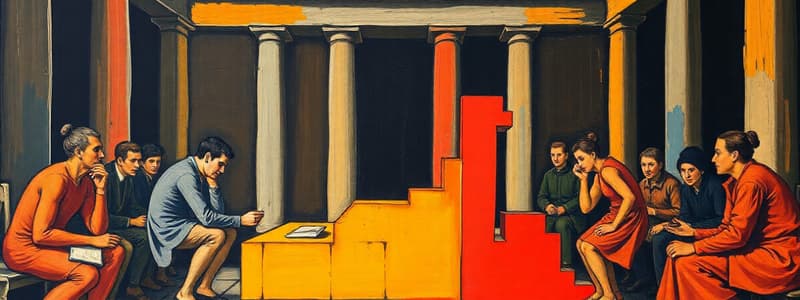Podcast
Questions and Answers
What is the primary focus of Foucault's 'Discipline and Punish'?
What is the primary focus of Foucault's 'Discipline and Punish'?
- The influence of capitalism on crime rates
- The development of the legal systems in Europe
- The psychological effects of punishment on individuals
- The historical evolution of prisons and punishment (correct)
Which concept is most closely associated with Foucault's discussion of power in 'Discipline and Punish'?
Which concept is most closely associated with Foucault's discussion of power in 'Discipline and Punish'?
- Biopower
- Sovereign power
- Legal power
- Disciplinary power (correct)
How does Foucault view the relationship between knowledge and power in 'Discipline and Punish'?
How does Foucault view the relationship between knowledge and power in 'Discipline and Punish'?
- Knowledge undermines power by creating resistance.
- Knowledge is a tool used to control and exert power. (correct)
- They are inherently separate and do not affect each other.
- Power only emerges from economic forces, not knowledge.
In 'Discipline and Punish', what does Foucault critique about the modern penal system?
In 'Discipline and Punish', what does Foucault critique about the modern penal system?
What does Foucault mean by the term 'panopticism' in 'Discipline and Punish'?
What does Foucault mean by the term 'panopticism' in 'Discipline and Punish'?
Flashcards
Foucault's Discipline and Punish
Foucault's Discipline and Punish
A book examining the historical shift in how societies punish and control individuals.
Punishment in the past
Punishment in the past
Public, brutal, and theatrical displays of power.
Modern punishment
Modern punishment
More subtle, less visible means of social control.
Panopticon
Panopticon
Signup and view all the flashcards
Discipline
Discipline
Signup and view all the flashcards
Study Notes
Introduction
- Foucault's Discipline and Punish examines the evolution of punishment and its relationship to power in the 17th and 18th centuries.
- It argues that punishment shifted from a spectacle of public torture to a more hidden and pervasive form of disciplinary control.
The "Ancien Régime" – Public Spectacles of Punishment
- Punishment in the pre-modern era was public, brutal, and theatrical.
- Often these punishments involved excruciating physical pain, intended to deter and serve as a warning to the public.
- These acts were meticulously staged and designed as spectacles.
- Public executions were displays of power meant to reinforce the authority of the sovereign.
The Emergence of the "Panopticon"
- Foucault examines the emergence of new methods of control and surveillance.
- The panopticon is a metaphor for this new way of exercising power, a circular prison design.
- A single guard can observe all prisoners without being seen
- This creates an effect of constant potential visibility, leading inmates to regulate their own behavior.
Disciplinary Power
- Modern disciplinary power is diffuse and pervasive, not solely centralized in the sovereign.
- It's located in institutions—schools, factories, hospitals—where individuals are subjected to precise forms of control and regulation.
- Power operates through normalization and the establishment of norms.
Mechanisms of Discipline
- Disciplinary techniques monitor and regulate individuals' behaviors.
- Key mechanisms include hierarchies, inspections, examinations, and normalization.
- The aim is to create docile bodies through training and control.
The Body and the Soul
- The body is shaped and controlled by disciplinary practices.
- Disciplinary techniques extend beyond physical control to regulate thoughts, feelings, and desires.
- Foucault argues that individuals internalize these disciplinary norms, becoming self-regulating.
Power as Knowledge (and Vice Versa)
- Power and knowledge are inextricably linked.
- Disciplinary institutions produce knowledge about individuals, which is also a tool of power.
- This relationship strengthens the power dynamic.
Critique of Institutions
- Institutional power structures are pervasive, influencing almost all aspects of daily life.
- Foucault critiques the normalization of the modern era as detrimental to individual freedom.
Impact on Society
- Disciplinary power structures significantly shape social behavior.
- The ideas in the book have inspired critical perspectives on societal institutions and individual behavior in later eras and theoretical approaches to social justice.
The Role of the Sovereign
- The sovereign's role in punishing increasingly shifts from a direct, visible act to an indirect control.
- Punishment becomes more controlled and less about public display and more about reforming the individual.
The Transformation of Punishment
- Foucault argues that punishment in modern society evolved from a public spectacle to a more 'hidden' system of control.
- This means that the pain, spectacle, and impact of punishment is now internalized.
Impact and Legacy
- Discipline and Punish had a profound impact on the social sciences and the humanities.
- It became influential in various fields, leading to critical analyses of power, knowledge, and the body.
- The concept of self-regulation and disciplinary practices have become vital components in various social analyses.
Studying That Suits You
Use AI to generate personalized quizzes and flashcards to suit your learning preferences.
Description
Explore Michel Foucault's seminal work, Discipline and Punish, which analyzes the shift from public torture to subtle forms of discipline in society. This quiz covers key concepts such as the 'Ancien Régime' and the panopticon, illustrating how power dynamics evolved in the 17th and 18th centuries.




